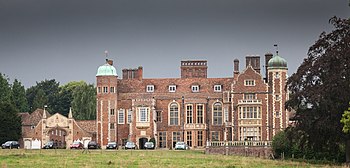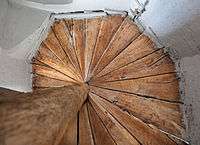Institute of Continuing Education
The Institute of Continuing Education (ICE) is a constituent part of the University of Cambridge, dedicated to providing and promoting continuing education. It is primarily based at Madingley Hall in the village of Madingley, near Cambridge, England. The institute has its origins in a series of lectures given by James Stuart in 1867.
 The Institute's headquarters at Madingley Hall | |
| Founder | James Stuart |
|---|---|
| Affiliation | University of Cambridge |
| Director | Dr James Gazzard |
| Location | , |
History
The founder of ICE was University of Cambridge scientist James Stuart.[1][2] In 1867, Stuart gave a course of lectures in various cities, which marked the beginning of the university extension movement. The University of Cambridge sanctioned the movement a few years later, in 1873, with the first course offered in Derby that year.[3]
In 1873 the Local Lectures Syndicate was appointed, which included James Stuart, as well as Brooke Westcott, Joseph Lightfoot, and Henry Sidgwick.[4] ICE moved to Madingley Hall in 1975,[5] but has been educating part-time and adult students since the 1860s.[6] The institute received its current name after it was re-established from being the Board of Continuing Education on 1 January 2001.[7] It is the oldest continuing education department in the United Kingdom.[5]
Location and buildings
The institute's headquarters are in the village of Madingley, Cambridgeshire. It is housed in Madingley Hall, about four miles west of the Cambridge city limits.[6] Madingley Hall was built in the 1540s and was later rented by Queen Victoria for the young Prince of Wales (later Edward VII) while he was a student at Cambridge.[5][6][8]
Offerings, students, and staff
ICE offers residential, online, weekend, summer, and part-time courses, as well as public lectures.[5] The institute also provides free public concerts performed by Cambridge musicians, featuring new student work alongside more traditional repertoire.[9][10]
The institute has an enrollment of over 6,000 students and has an academic staff of 13. A summer program brings in another 1,000 students from over 60 countries.[5] The academic staff are called "lecturers", and the institute's teaching is also accomplished by a group of about 300 "tutors" located in the Cambridge area and elsewhere.[5][1]
ICE offers course credits via the United Kingdom's Credit Accumulation and Transfer Scheme, and those credits may be transferable to other Cambridge degree programs, and to other U.K. and U.S. universities.[6] The duration of study varies, from one and two-day courses, through two-year part-time master's degrees, and courses are often taken for personal interest or for professional development.[5]
Supervision by university
In 2008, when Cambridge University indirectly offered its stamp of approval for certificates in things like "garden history" and "creative writing", the university faced accusations of dumbing down.[11] According to The Daily Telegraph, the university decided to, "take over the awarding of certificates currently offered by bodies such as the Cambridge Institute of Continuing Education….”[11]
Today, the work of ICE is controlled by the general board of the university, through a management committee. The institute's lecturers are all appointed by the university.[1]
References
- Barlow, Adrian. Extramural: Literature and Lifelong Learning, pp. 18-19. (Lutterworth Press 2012).
- Beyeler, Marc (2015-05-15). "Institute of Continuing Education to sponsor Team of the Year prize at News' Junior Sports Award". Cambridge News. Archived from the original on 2015-07-24.
- Jarvis, Peter. Adult Education and Lifelong Learning: Theory and Practice, p. 318 (Routledge 2004).
- Welch, Edwin (1974). The Peripatetic University. England: Cambridge University Press. p. 43. ISBN 9780521201520.
- Care, Adam (October 24, 2014). "You're never too old for a Cambridge education". Cambridge News. Archived from the original on 2015-09-23.
- Henderson, C.W. Open the Gates to the Ivy League: A Plan B for Getting into the Top Colleges, p. 87 (Penguin 2013).
- "Annual Report of the Board of Continuing Education, re-constituted as the Institute of Continuing Education, 2001-02". Cambridge University Reporter. Archived from the original on 2015-12-10.
- Care, Adam (2015-04-23). "More than 380 species discovered at Cambridge University's Madingley Hall". Cambridge News. Archived from the original on 2015-09-23. Retrieved 2015-06-13.
- paulireland (2015-02-18). "Ghislaine McMullin plays Russian cello music". Cambridge News. Archived from the original on 2015-07-21.
- Institute of Continuing Education. "Institute of Continuing Education (ICE): Concerts". Archived from the original on 2019-05-12. Retrieved 2019-07-26.
- Bingham, John (2008-12-22). "Garden history and 'wellbeing' qualifications from Cambridge University". The Daily Telegraph. Archived from the original on 2019-04-25.




